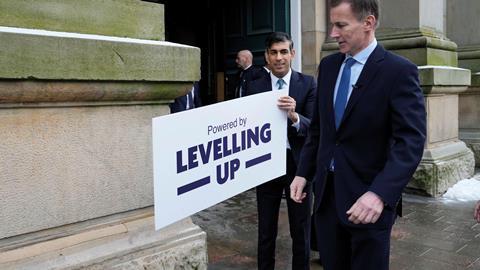Legal advisers are keen to help clients benefit from the government’s ‘levelling up agenda’, hears Maria Shahid. But political uncertainty is the enemy of investment
The low down
The economic disparities between the UK’s richest and poorest regions blight lives and damage the country’s competitiveness. A government commitment to ‘levelling up’ was a central promise to the ‘red wall’ seats the Conservatives won from Labour in the 2019 election. But finding policies to match the slogan has proved challenging. Not least, the levelling up agenda places a heavy emphasis on unpopular reforms to planning law. Awards from the Levelling Up Fund have also proved controversial, not least because bids are expensive to make. Lawyers stand ready to assist local authorities and businesses on which progress depends, but they are unimpressed with the unresolved conflicts of government policy – in particular on its commitment to achieve ‘net zero’.
A commitment to ‘levelling up’ the country was a manifesto promise made by the Conservative party in 2019. When it won the subsequent general election, government attention turned to implementing this. Grants from the Levelling Up Fund are part of that strategy, but reform of the planning system was deemed even more central to the policy’s success.
Planning and politics, though, make for uncomfortable bedfellows. And the political turmoil which unfolded in the second half of 2022 and its repercussions for planning policy have left lawyers wondering what to expect next.
‘There have been three iterations of how planning is going to look in the last three years, and they have all been very different,’ says Nicola Gooch, partner at Irwin Mitchell, epitomising a weariness that is echoed by other parts of the planning community.
‘If planners are struggling to come to grips with it all, what hope is there for the rest of us?’ asks Rebecca Pendlebury, Bevan Brittan’s property lead.
The 2020 planning white paper, Planning for the Future, first introduced long-term proposals for structural changes to the English planning system. It promised an overhaul of the current planning process, which would be replaced with a clearer, rules-based system.
The white paper received around 44,000 responses, although the government recently announced that it would not in fact be making its own specific response. That has been met with frustration by the many planning lawyers who spent hours poring over and responding to the detail.
This was followed by the Levelling Up white paper, in 2022, and then the Levelling-Up and Regeneration Bill, which was first placed before parliament in May 2022.
'If planners are struggling to come to grips with it all, what hope is there for the rest of us?'
Rebecca Pendlebury, Bevan Brittan
Simon Ricketts, partner at Town Legal, says: ‘The Levelling Up white paper was heavy on research and analysis, and light on actual proposals. Insufficient money was committed from the outset.’
The bill, or LURB, took forward some of the proposals from the white paper, and aimed to put in place the foundations for ensuring ‘all parts of the country share equally in our nation’s success’, involving the local community in development taking place in their area, with decision-making being made more accessible for all.
But in July 2022 the proposed legislation came to a grinding halt, as levelling up secretary Michael Gove became one of the first casualties of the turmoil in the Conservative party followed by the resignation a day later of prime minister Boris Johnson. The LURB, it seemed, was now on the back-burner.
Then in September, under Liz Truss’s premiership, the Growth Plan became the star attraction, paired with the promise of investment zones (local authorities spent some £12.5m on bids for these now-defunct investment zones, according to one estimate).

It was perhaps with some relief that planning professionals welcomed back Gove as secretary of state for levelling up, housing and communities in October of last year.
November’s autumn statement reaffirmed the government’s commitment to levelling up, and Gove, in a written ministerial statement which followed, confirmed that the LURB would continue to make its way through parliament.
Devolution was promised to all areas in England that wanted it by 2030, a commitment that was reaffirmed by Gove in a speech to the Convention of the North on 25 January, in which he spoke of the benefits of ‘strong mayoral leadership’ in Greater Manchester, the West Midlands and the Tees Valley, and their role as ‘agents of economic growth’.
Funding announcements for a select group of projects across the country amounting to £2.1bn were also made public earlier in January. The stated objectives are laudable, say lawyers, but do little to remedy the policy chaos evident in other parts of the levelling-up agenda.
‘There seems to be a disconnect when it comes to what levelling up actually is and what the government intends to do,’ says Gooch. ‘There’s no silver bullet. If you are genuinely going to level up and increase economic activity across the country, then that is a big job – to actually level up. It’s a multi-generational project. And yet, what’s actually coming out of the LURB is a lot of short-term, comparatively small investments and initiatives. The funding is nice, but will it improve our local services? There are some real systemic issues that need addressing.’
‘The government has fought shy of regional government, but that is the obvious way forward,’ says Ricketts. ‘At the moment it’s very limited to city regions.’
In January, Gove spoke of ‘deepening’ devolution in Greater Manchester and the West Midlands, and ‘broadening’ it to other parts of the country, referencing the ‘huge progress in extending devolution across the north’, and a return to negotiations with Cumbria, Lancashire, Cheshire and Warrington, and Hull and East Yorkshire. It remains to be seen how this will be implemented.
While Gooch acknowledges that devolution is important to levelling up, she has reservations: ‘Devolution can make a difference, but it has to be devolution-proper, with direct spending powers and actual ability to make decisions. The LURB has actually got a lot of centralist control under its devolution model. It’s also dependent on having a metro mayor in place. In my view, from a planning perspective, what will really make a difference is proper strategic regional planning across local authority boundaries. The issues that the LURB is tackling don’t stop at local authority borders – we have to have a wider approach to them. The duty to cooperate, which is what has replaced regional plans, has been an abject failure, and we need to look at the regions as a whole. It is devolution with a wider lens perspective.’
Pendlebury agrees, saying that while the planning reforms and the LURB have laudable aspirations, local plans will remain secondary to national policy if there is any conflict. ‘There won’t be as much power at a local level as people think,’ she notes.
Green growth
Infrastructure specialists have voiced concern about a section of the LURB which replaces the EU-derived regime for environmental impact assessments with a home-grown version to be called environmental outcomes reports – in particular its implications for their developer clients.
‘These involve a more dynamic system of assessing projects against an ever-tightening set of environmental targets, which is surely a laudable aim, but the lack of detail so far is unnerving clients with large development proposals in the offing,’ notes Angus Walker, partner at BDB Pitmans. ‘It will be quite a challenge for the government to introduce something that isn’t so feeble that everything gets consented or so strict that nothing does.’
He adds: ‘So, as always, the devil will be in the detail, consultation on which is supposedly fairly imminent. At one extreme this could revolutionise the profession of environmental assessment, which now involves thousands of people in this country alone, and at the other it could simply copy the old regime but give its elements new names. Time will tell.’
Conflict and politicisation
Pendlebury is wary of the conflict that the current planning system generates: ‘There is something awry with a system that allows such conflict to take place. Nine out of ten planning permissions are granted; this “local authority versus housing developer” polarisation is blown out of context. The reality doesn’t support the soundbites. I would have liked to have seen increased power to allow the local plan to accurately reflect local issues, without being subservient to the national development management policy.’
Part of the issue is the politicisation of the planning system, adds Gooch: ‘Our current political system has significant populist overtones in it. Local politicians are taking a more immediate protectionist view because of austerity.’
In addition, a huge under-resourcing of local authority planning departments is slowing things down, she notes.
‘For our clients, planning applications are taking longer to go through, as well as becoming more contentious, with more enforcement proceedings and judicial reviews taking place. It’s become a very politicised and abusive system to work in.’
Gove’s December 2022 announcement on housebuilding targets, following lobbying by backbench Conservative MPs, only served to add to the confusion, notes Gooch.
'Economic growth by housebuilding was one of the government’s stated aims, and yet these new policies discourage that'
Nicole Cameron, Cripps
A series of amendments to the LURB saw current housing targets become ‘advisory’, with councils able to build fewer homes if it would change the character of an area significantly. Market commentators voiced concern at this perceived ‘watering down’ of housing targets given the national housing crisis.
A Guardian analysis published on 15 January noted that nine local authorities in England ‘have paused or scaled back’ their housebuilding plans after the announcement, joining nearly 30 other local authorities which had already done so while waiting for further clarification on housing targets from Westminster.
Nicole Cameron, senior associate at Cripps, believes that the December ministerial statement is likely to put pressure on her firm’s housebuilder clients. ‘Housebuilders like certainty,’ she notes. ‘Economic growth by housebuilding was one of the government’s stated aims, and yet these new policies discourage that. The 300,000 target [for new homes] is still in place, but is now “advisory” in nature. It makes it far easier for local authorities to not grant permission. It’s a blockage that is likely to put far greater pressure on housebuilders, and lead to a decrease in housebuilding work.’

Net zero frustrations
Frustrations over the LURB were further exacerbated when the detail of a consultation on proposed reforms to the National Planning Policy and a corresponding draft version of a new National Planning Policy Framework (NPPF) were published in late December.
Alex Minhinick, director in the planning and compulsory purchase team at Burges Salmon, explains that the draft NPPF seems to be at odds with the government’s net zero agenda, with the potential reduction in land available for solar farms.
Back in October 2022, environment secretary Ranil Jayawardena proposed amendments to the NPPF, meaning that land not hitherto classed as ‘best and most versatile land’ would fall into this category, and therefore be harder to use for such renewable energy purposes.
While the amendment was not adopted, a proposed change, in a footnote to the NPPF, requires that ‘the availability of agricultural land used for food production should be considered, alongside other policies… when deciding what sites are most appropriate for development’.
‘While it’s a relatively modest change to existing policy, what sits behind it is more concerning,’ Minhinick explains. ‘It creates uncertainty among developers. The projects we work on with our clients have a lifespan of years, and we are having to crystal ball gaze to some extent.’
He adds: ‘Energy infrastructure projects need to come forward across the country and particularly in rural areas. Unfortunately, the LURB, and how it’s emerging in the NPPF, is sowing doubt when what we really need is a clear policy direction, which ties in with the UK’s net zero goals.’

Plus ça change
It is an uncertainty that has had a knock-on effect on developer clients, notes Ricketts. ‘Over several years, the complexity of the planning system has led to the professionalisation of the development industry,’ he says. ‘So much so that when you embark on a significant scheme, it’s tricky unless you are really well resourced. The entry point to becoming involved in development has been significantly raised, with schemes faltering or slowing down because of the risk of viability. In London, a lot of things have come together at the same time, including significantly increased construction costs. Some schemes find things challenging, but we still see others going ahead.’
Much of the firm’s work comes from amending schemes to bring them into line with current policy, adds Ricketts. ‘Developers are having to navigate an increasingly complicated process. They are always having to look at the horizon.’
The LURB, he says, is not going to change the life of any planning lawyer. ‘A lot of our time is spent on the implications of case law such as the recent Supreme Court decision in Hillside, concerning the relationship between successive grants of planning permission for development on the same land, as well as on the community infrastructure levy (CIL), which is extremely complicated, with lots of money at stake. Mitigating the impact of the reliefs and extensions requires a lot of our attention. Added to this, the negotiation of section 106 agreements with local councils can also become an elongated and complicated process due to resourcing problems at councils. Concluding those negotiations can take up a lot of time.’
The LURB, adds Ricketts, misses the point completely in terms of making the system work more effectively: ‘The replacement of the CIL with the infrastructure levy (IL) will not make the system less complicated. Instead the stakes will be much higher as it captures contributions for affordable housing, which previously would have been captured by a section 106 agreement.’
The future
‘We are having to move a lot faster,’ notes Gooch. ‘Since 2020 we have had constant announcements. A lot of them have not materialised. Is section 106 really going to be replaced by the IL? People are now looking ahead to the next election. Labour don’t seem as keen on that, so it may not happen.’
The irony, she concludes, is that ‘the government wants private sector investment, but uncertainty is the enemy of such investment’.
Maria Shahid is a freelance journalist
































1 Reader's comment